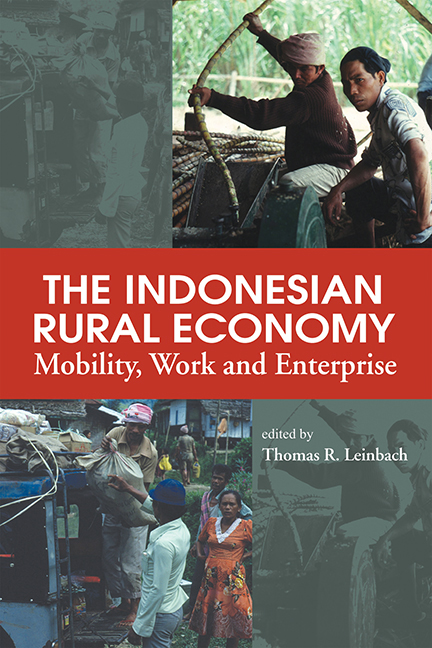Book contents
- Frontmatter
- Content
- List of Tables
- List of Figures
- Contributors
- Acknowledgements
- Glossary
- Foreword
- Part I The Development Context
- Part II Entrepreneurship, Gender and Mobility Issues
- Chapter 5 International Labour Migration and Rural Dynamics: A Study of Flores, East Nusa Tenggara
- Chapter 6 Gender, Socio-Spatial Networks, and Rural Non-Farm Work Among Migrants in West Java
- Chapter 7 Micro and Small-Scale Enterprises in Java: A Gender-Based Comparative Analysis of Entrepreneurial Behaviour and Performance of Enterprises
- Chapter 8 Migrant Entrepreneurs in East Indonesia
- Part III Indonesia's Rural Non-Farm Economy: Case Studies and Policy Development
- Index
Chapter 6 - Gender, Socio-Spatial Networks, and Rural Non-Farm Work Among Migrants in West Java
from Part II - Entrepreneurship, Gender and Mobility Issues
Published online by Cambridge University Press: 21 October 2015
- Frontmatter
- Content
- List of Tables
- List of Figures
- Contributors
- Acknowledgements
- Glossary
- Foreword
- Part I The Development Context
- Part II Entrepreneurship, Gender and Mobility Issues
- Chapter 5 International Labour Migration and Rural Dynamics: A Study of Flores, East Nusa Tenggara
- Chapter 6 Gender, Socio-Spatial Networks, and Rural Non-Farm Work Among Migrants in West Java
- Chapter 7 Micro and Small-Scale Enterprises in Java: A Gender-Based Comparative Analysis of Entrepreneurial Behaviour and Performance of Enterprises
- Chapter 8 Migrant Entrepreneurs in East Indonesia
- Part III Indonesia's Rural Non-Farm Economy: Case Studies and Policy Development
- Index
Summary
Introduction
In post-1997 Indonesia, the convergence of political and macro-economic upheavals has altered the context of mobility and employment processes (Booth 2000). Structural adjustment programmes, rapid inflation, and increasing labour market flexibility have reorganized migrants’ social networks and spatial behaviour patterns in ways that have had critical implications for low-income peoples’ reliance on the rural non-farm sector (Manning and van Dierman 2000). Indeed, in the first years following the financial crisis (1997–99), low-income people in Indonesia relied increasingly on their social safety nets for their survival. (Cameron 1999). The operation of these safety nets in coping with crisis periods is in part a function of the gender characteristics of the networks, and is linked to the vitality of the specific rural non-farm economy (RNFE), the agricultural economy, and the urban labour market to which migrants are linked.
How have particular gender dynamics of networks, and in particular the gender-specific connections to the rural non-farm sector, facilitated or inhibited individuals’ and households’ access to resources during this period of economic contraction? This chapter aims to examine this question through analysis of two important issues. The first deals with how households and individuals in two villages with distinct socio-spatial networks have adopted different mobility and resource exchange patterns, and thus have relied in different ways on the rural non-farm sector during the economic crisis period. The second looks at how the gender dynamics of social networks have influenced resource access patterns linked to the rural non-farm sector under crisis. To illustrate the operation of these processes, the chapter compares the socio-spatial networks that connect two destination sites in Bekasi and Rancaekek, West Java, Indonesia with the primary origin regions of West Java and Central Java, respectively of the majority of circular migrants in each network. In these cases, both the RNFE's characteristics as well as the gender relations of the networks have shaped the ways that people have weathered resource shortages during this period of time.
At issue are two types of safety nets: household-scale and extra-household (i.e., inter-village network-scale and village-scale). While these two types of safety nets are similar and related, they are not identical, and the activities and interactions of each type provide different kinds of resources.
- Type
- Chapter
- Information
- The Indonesian Rural EconomyMobility, Work and Enterprise, pp. 134 - 151Publisher: ISEAS–Yusof Ishak InstitutePrint publication year: 2003

